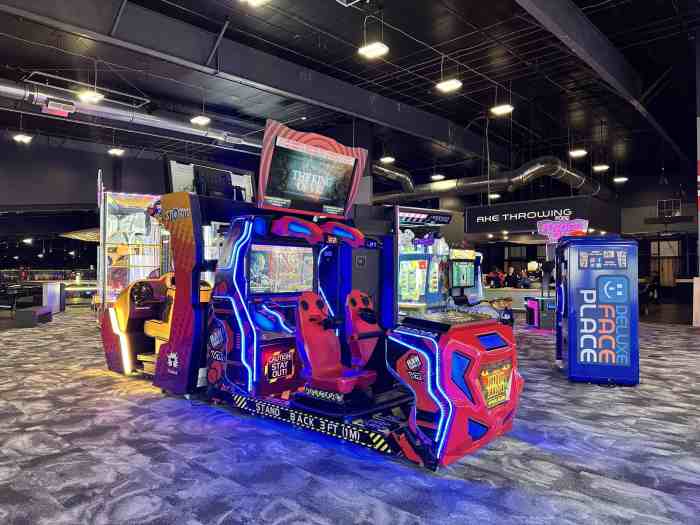
Arcade token systems are the backbone of countless gaming environments, offering a unique way for players to engage with their favorite games.
These systems work by allowing players to exchange currency for tokens, which are then used to play various arcade games. Not only do they simplify transactions, but they also enhance the overall gaming experience, making it more immersive and enjoyable for players while providing operators with a reliable revenue model.
Understanding Arcade Token Systems

Arcade token systems serve as a key component in modern gaming environments, allowing players to engage with games in a structured and financially manageable way. These systems not only enhance the gaming experience but also streamline arcade operations, creating a win-win scenario for both players and operators.At their core, arcade token systems function as a form of currency that players use to access games and attractions.
Instead of using cash directly, players purchase tokens from machines or at kiosks, which they then use to play various games. This token system reduces the hassle of handling coins and bills during gameplay, allowing for a more enjoyable and uninterrupted gaming experience. Tokens can often be bought in bulk, providing players with an incentive to spend more time enjoying the arcade.
Mechanics of Token Systems
The mechanics of arcade token systems involve several essential components that contribute to their effective operation within gaming environments. Typically, tokens are either physical coins or digital credits that have specific values assigned to them. Here are some key mechanics:
- Purchase Process: Players acquire tokens by exchanging cash at token dispensers or kiosks. Many arcades offer discounts for bulk purchases, which encourages players to buy more tokens upfront.
- Game Access: Each game in the arcade is assigned a token cost. Players insert the required number of tokens into the game machine to start playing. This clear cost structure helps players manage their spending.
- Token Redemption: After playing, players can often redeem leftover tokens for prizes or additional credits, creating an incentive to continue playing and engage with a variety of games.
- Digital Systems: With advancements in technology, many arcades have transitioned to digital token systems. Players purchase credits through mobile apps or RFID cards, allowing for a seamless gaming experience without the need for physical tokens.
Advantages and Disadvantages of Token Systems
Token systems present various advantages and disadvantages for both arcade operators and players. Understanding these can help stakeholders make informed decisions regarding their arcade experience.For arcade operators, the advantages include:
- Operational Efficiency: Token systems reduce the need for handling cash, streamlining transactions and minimizing the risk of theft.
- Enhanced Customer Experience: Players can easily monitor their spending and playtime, making for a more enjoyable visit.
- Increased Revenue: The ability to purchase tokens in bulk can encourage players to spend more, thereby increasing overall revenue.
However, there are also disadvantages:
- Initial Setup Costs: Implementing a token system requires investment in token dispensers or digital infrastructure.
- Player Confusion: New players might find the token system confusing if they are accustomed to direct cash transactions.
For players, the advantages include:
- Budget Control: Tokens allow players to set a limit on their spending, which can help manage gaming costs.
- Incentives for Loyalty: Many arcades offer rewards for frequent players, redeemable with tokens.
Yet, disadvantages exist as well:
- Loss of Value: Unused tokens can feel like wasted money if players do not return to redeem them.
- Frustration with Redemption: Players may experience frustration if token systems are not user-friendly or if they cannot easily redeem their tokens for rewards.
The Impact of Arcade Token Systems on Gameplay
Arcade token systems have revolutionized the way players interact with coin-operated games, transforming the traditional gaming landscape. These systems have not only altered the mechanics of play but have also influenced player behavior, game selection, and overall gaming experience. Understanding these impacts is crucial for both arcade operators and players to enhance engagement and enjoyment.The introduction of token systems creates a unique dynamic where players must adapt their strategies and choices based on the availability and value of tokens.
This system fosters a different kind of investment in gameplay, where players often find themselves selecting games based on token value and potential rewards rather than simply the play style or genre.
Influence of Token Systems on Player Behavior
Token systems significantly shape how players approach their gaming experience. Players may exhibit varying behaviors based on the structure of the token system in place. Key influences include:
- Game Selection: Players often gravitate towards games that offer higher token payouts or perceived value. This can lead to a clustering effect around specific titles that are seen as more rewarding.
- Spending Patterns: The use of tokens can create a sense of controlled spending, where players feel they are managing their gaming budget more effectively, reducing the risk of overspending compared to direct cash payments.
- Competitive Play: Tokens can incentivize competition among players, as accumulating tokens becomes a goal in itself, heightening engagement and social interaction within the arcade environment.
Relationship Between Token Systems and Player Retention
Player retention is crucial for the success of any arcade, and token systems play a pivotal role in this aspect. The features of token systems that contribute to retention include:
- Incentivized Rewards: Many arcades offer loyalty programs based on token accumulation, motivating players to return and continue playing to earn rewards or bonuses.
- Exclusive Access: Tokens can grant players access to special games or events, creating a sense of exclusivity that encourages them to return to the arcade.
- Social Dynamics: The community aspect of arcade gaming is strengthened through token systems, as players often return to compete with friends or meet new players, fostering a loyal customer base.
Enhancement and Diminishment of the Gaming Experience
Tokens can significantly influence the overall gaming experience in both positive and negative ways. The following points elaborate on these effects:
- Enhanced Experience: Token systems often provide a streamlined payment experience, eliminating the hassle of handling coins and making gameplay smoother.
- Game Variety: The introduction of tokens allows for a wider range of games, as arcades can set different token costs based on the complexity and appeal of each game, encouraging diversity in gameplay.
- Pacing of Play: Tokens can affect the pacing of play, as players may take more time to think about their next move, knowing they are using a limited resource.
- Potential Frustration: On the downside, if players feel that tokens are difficult to earn or that certain games are rigged, it can lead to frustration and diminish overall enjoyment.
“Token systems can enhance the arcade experience by providing both structure and excitement, but they must be balanced to avoid discouraging players.”
Exploration of Other Gaming Formats

Arcade token systems provide a unique gaming experience characterized by their distinct progression mechanics and engagement strategies. When compared to other gaming formats, such as board games, card games, and various online environments, one can see a diverse range of token-like structures and their significant impact on user interaction and gameplay dynamics.
Comparison with Currency Systems in Board Games and Card Games
In board games and card games, currency systems often serve as the backbone for trading, purchasing, or point accumulation. Unlike arcade token systems, which are typically tied to physical or digital tokens that players use to engage in games directly, currency systems in these formats can be more abstract.The currencies usually come in the form of points, chips, or in-game money, allowing players to make strategic decisions based on available resources.
Here’s a closer look at how these systems compare:
- Token vs. Currency: Arcade tokens are physical or digital currencies that directly influence gameplay, while board game currencies often represent points that can be accumulated and spent.
- Interaction Level: Arcade systems facilitate immediate feedback and engagement through direct exchanges, whereas board game currency systems often require a longer-term strategy and foresight.
- Player Experience: The tactile experience of using tokens in arcades can lead to stronger emotional responses, while board game currency systems may foster deeper cognitive engagement through strategy.
Token-like Mechanics in Online Games
Token-like mechanics in online games serve as a crucial element in enhancing user engagement and retention. These mechanics often manifest as virtual currencies, achievements, or collectible items that players can earn during gameplay.Such systems can create a compelling loop that encourages players to return and continue playing. Some notable features include:
- Progression Systems: Players earn tokens or virtual currencies as they progress, which can unlock new levels, characters, or features, thereby enhancing the gameplay experience.
- Social Engagement: Online games often incorporate token-like rewards that players can share or compete for, fostering a sense of community and competition.
- Incentivization: Daily rewards and achievements in online games motivate players to log in regularly, using token-like mechanics as a way to keep the gameplay cycle active.
Comparison with Reward Systems in Roleplaying and Video Games
Roleplaying games (RPGs) and many video games employ reward systems that can closely resemble arcade token systems. Both systems provide players with incentives to engage further with the game.In RPGs, players earn experience points, loot, or in-game currency, which can affect their character development and gameplay. Here’s how these systems correlate:
- Reward Structure: Arcade tokens provide immediate rewards for gameplay, while RPGs may offer delayed gratification through leveling up and acquiring new skills.
- Player Motivation: Both systems aim to enhance player motivation; however, arcade tokens focus on immediate engagement, while RPG rewards often emphasize long-term progression.
- Investment: Players invest time and effort into both systems, but RPGs often require a deeper emotional investment due to character attachment and narrative involvement.
Closure
In conclusion, arcade token systems play a crucial role in shaping the gaming landscape, influencing player behavior and retention.
Whether enhancing the excitement of gameplay or serving as a gateway for social interaction among players, these systems continue to evolve, reflecting the dynamic nature of the gaming industry.
Essential Questionnaire
What are arcade token systems?
Arcade token systems are a method for players to purchase tokens that are used to play arcade games rather than using cash directly.
How do token systems affect player retention?
Token systems encourage repeated visits as players tend to accumulate tokens over time, fostering a sense of investment in the arcade experience.
Are there disadvantages to using token systems?
Yes, some players may find it inconvenient to purchase tokens separately, and it can create confusion if not managed well.
How do arcade token systems compare to other gaming formats?
Unlike direct currency systems in board games or online games, arcade tokens create a unique and tangible connection to the gameplay experience.
Can token systems be integrated with mobile games?
Absolutely! Many mobile games use token-like mechanics to enhance user engagement and create a rewarding gaming experience.






